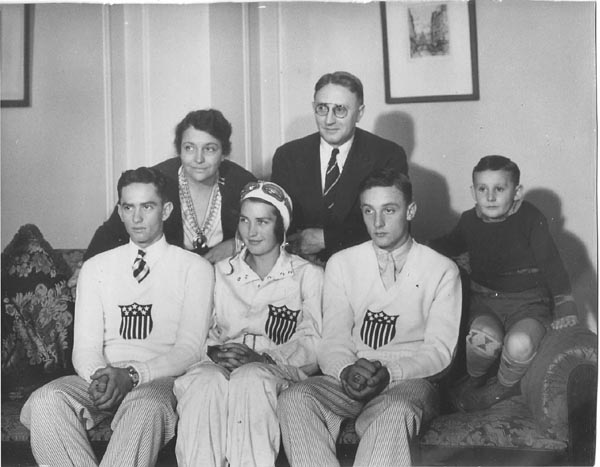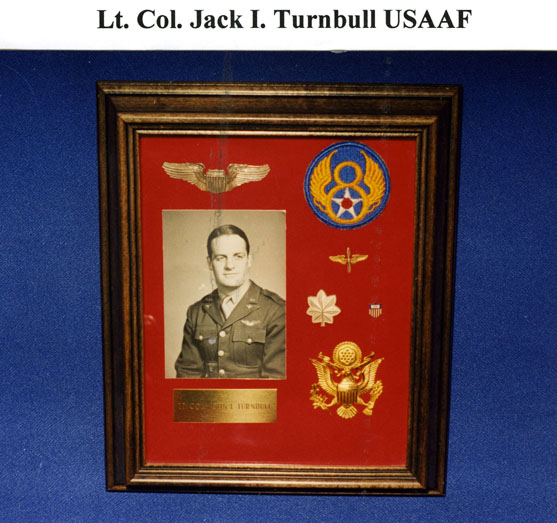Rupert Beach Turnbull  Jr., was born October 3, 1913, in Pasadena, California. Having completed high school at Momosa, California, he attended Pomona College in Claremont, graduating in 1936. Rupert’s talents were already showing; an expert horseman and fencer, he played piano in the school orchestra and in medical school. Rupert also competed in the Olympic trials for the 100-meter sprint. In 1932 the “Turnbull kids”, Rupert, Loretta and Raymond represented the United States in the outboard hydroplane races held in Italy. Along to cheer on the Turnbull racing team was their father, Rupert Sr., their mother Mary Irene and youngest brother Byron. The Turnbulls won every race on the Po River at Torino, Italy, and went to Lake Garda and brought home the cup for the United States.
Jr., was born October 3, 1913, in Pasadena, California. Having completed high school at Momosa, California, he attended Pomona College in Claremont, graduating in 1936. Rupert’s talents were already showing; an expert horseman and fencer, he played piano in the school orchestra and in medical school. Rupert also competed in the Olympic trials for the 100-meter sprint. In 1932 the “Turnbull kids”, Rupert, Loretta and Raymond represented the United States in the outboard hydroplane races held in Italy. Along to cheer on the Turnbull racing team was their father, Rupert Sr., their mother Mary Irene and youngest brother Byron. The Turnbulls won every race on the Po River at Torino, Italy, and went to Lake Garda and brought home the cup for the United States.
Rupert graduated second in his class from medical school (1940) at McGill University. After internship at South Pacific Hospital in San Francisco, he served in the
Panama Canal Zone in 1941 at Gorgas Memorial Hospital. There he acquired expertise in tropical diseases, to the dismay of multiple surgical residents in later years when they found themselves attempting to describe the intricacies of the life cycle of the anopheles mosquito.
During the war years, Naval Lieutenant Commander Rupert Turnbull served as a field surgeon with the 1st Marine Division in the South Pacific. From Okinawa, he finished out the war at Tien-Tsin in China as Hospital Commander. Having aspirations at one time for a career in neurosurgery, Rupert, however, was persuaded by another young surgeon in the service to continue his surgical training at the Cleveland Clinic. Neurosurgery’s lost was the Clinic’s gain; there, Dr. Turnbull completed his training under the tutelage of Dr. Tom Jones, an accomplished in all types of abdominal surgery, and was renowned for his colon surgery. This leading Dr. Turnbull to a career stamped by achievement after achievement.
Rupert Turnbull conti nued to apply his genius to other fields. He was a world authority on ulcerative colitis and Crohn’s disease (1960’s- 1970’s). His practice in these areas was unsurpassed by any contemporary surgeon. Surgeons from all over the United States and from practically every continent attended his operating sessions in droves. Coinciding with recognitions of Rupert Turnbull as the preeminent colonic surgeon in the country was the prolific contributions to the surgical literature in articles and books. By this time his reputation was international and Rupert’s calendar of speaking engagements encompassed all points of the globe. His surgical capacity had to be seen to be believed, yet he could still muster the energy required that was the envy of his bone weary residents, some 20 or 30 years his junior. Patients loved and revered him. His concern extended to the point where patients were given his home telephone number and “call me anytime if you have any questions.”
nued to apply his genius to other fields. He was a world authority on ulcerative colitis and Crohn’s disease (1960’s- 1970’s). His practice in these areas was unsurpassed by any contemporary surgeon. Surgeons from all over the United States and from practically every continent attended his operating sessions in droves. Coinciding with recognitions of Rupert Turnbull as the preeminent colonic surgeon in the country was the prolific contributions to the surgical literature in articles and books. By this time his reputation was international and Rupert’s calendar of speaking engagements encompassed all points of the globe. His surgical capacity had to be seen to be believed, yet he could still muster the energy required that was the envy of his bone weary residents, some 20 or 30 years his junior. Patients loved and revered him. His concern extended to the point where patients were given his home telephone number and “call me anytime if you have any questions.”
In 1976, the Rupert B. Turnbull Surgical Society was founded by popular demand from Rupe’s numerous former residents and fellows. He was on the Editorial Board of many scientific journals, including Diseases of the Colon and Rectum. After reaching mandatory retirement age at the Cleveland Clinic, Rupert Turnbull moved to the Santa Barbara Clinic where he continued clinical work until his illness prevented that. Yet his ties to the Cleveland Clinic were irrevocable and he remained in constant communication with the surgeons there. To the surgeons he trained, he was larger than life size; he was a heroic figure, to be emulated.
Rupert Turnbull was a striking figure: tall, handsome and dignified. Success never spoiled him and he remained unassuming and approachable to all. Of deep religious faith, he was a constant reader of the Bible and could quote literally from this. Rupert was devoted to his family, and constantly expressed pride in their accomplishments.
Rupert Turnbull passed away February 18, 1981, in Honolulu, Hawaii. His beautiful wife, Dougal, resides in La Jolla, California. His two sons, a daughter and seven grandchildren also survive him.


































.jpeg#joomlaImage://local-images/tcalibrary/museum/vmpeople/John%20I%20Turnbull%20(Jack).jpeg?width=960&height=1169)







.jpg#joomlaImage://local-images/tcalibrary/museum/vmpeople/Malcolm_Turnbull_PEO_(cropped).jpg?width=656&height=960)
















